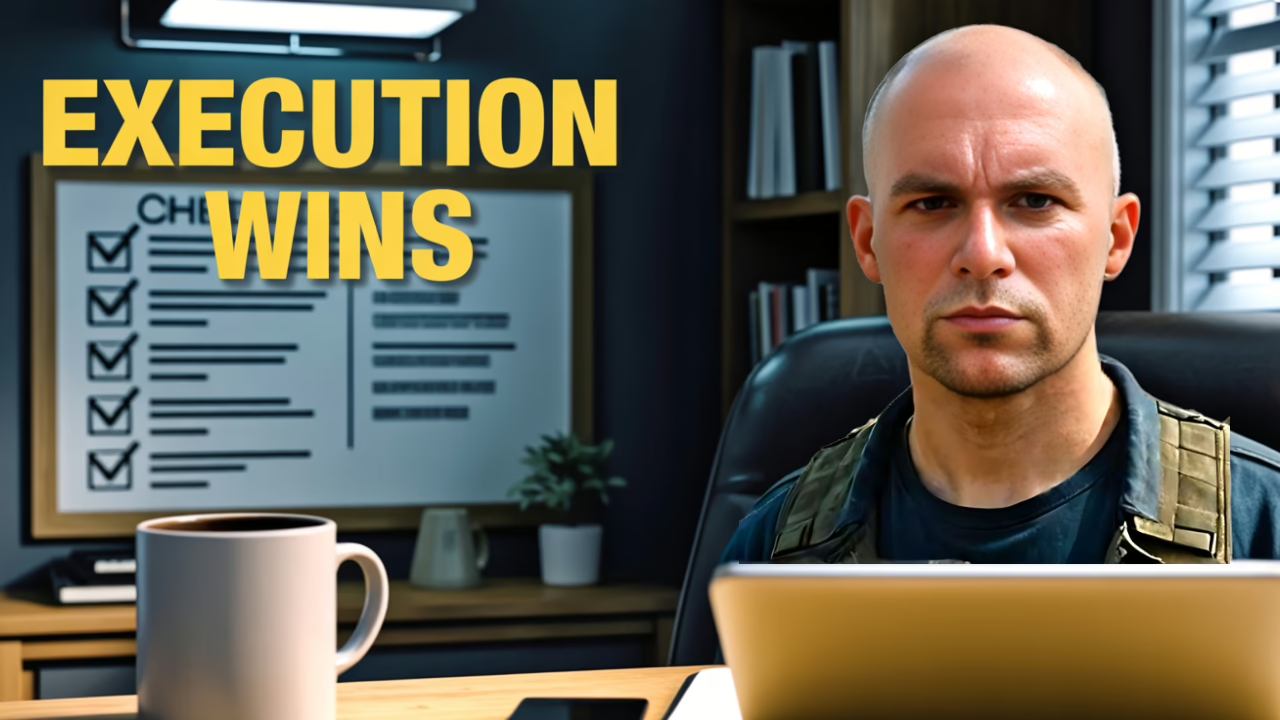You ever draw up the perfect game plan, only to watch it crumble the moment things get real? That’s me—years ago, I thought my meticulously plotted business launch would guarantee success. Then reality arrived, unpredictable as a storm. That’s when my military friends told me: “No plan survives first contact.” Turns out, victory doesn’t come from clever ideas alone—it’s earned by putting one foot in front of the other, even when the path shifts under you.
1. Why Execution Eats Strategy for Breakfast (and Drinks Your Coffee Too)
Let’s be honest: it’s easy to fall in love with a business plan. I’ve seen entrepreneurs (myself included) spend weeks—sometimes months—polishing pitch decks, mapping out every possible scenario, and tweaking strategies until they gleam. But here’s the hard truth: nothing happens until you act. In the world of veteran business execution strategies, action beats intention in entrepreneurship every single time.
Veteran Insights: Hesitation Is the Real Enemy
One of the first lessons drilled into us in the military was simple: hesitate, and you lose the window for success. Whether you’re leading a squad or launching a startup, the principle is the same. Overthinking kills more startups than risk itself. Decisive action planning in business isn’t just a buzzword—it’s a survival skill.
Action isn’t just for the battlefield; in boardrooms, it’s what creates progress. – Ret. Col. Maggie Harris
Why Action Outpaces Planning
Plans-only businesses rarely take off. I’ve watched talented founders get stuck in analysis paralysis, convinced that one more tweak will make their strategy bulletproof. But business strategy execution is about momentum. The moment you start moving—making calls, sending emails, shipping products—you’re learning and adapting faster than any static plan allows.
- Veterans transfer rapid execution from military to entrepreneurship. We’re used to acting fast, then adjusting on the fly—just like DARPA’s iterative approach to defense strategy.
- Adaptation beats rigid planning. The market changes. Competitors move. Customers shift. If you wait for perfect conditions, you’ll miss your shot.
Anecdote: My Launch Flop
I’ll never forget my first product launch. I spent months on slides, branding, and strategy sessions. When launch day came, I had zero customers. Why? Because I hadn’t actually talked to anyone. The moment I ditched the slides and started making calls, things changed. That’s when I learned: execution is the real differentiator.
Veteran Business Execution Strategies: 4 Keys
- Set Clear Priorities: Focus on what truly moves the needle. Don’t get distracted by busywork.
- Act Before Perfect: Launch before you’re ready. You’ll never have all the answers up front.
- Review and Adjust: Execution means adapting in real time, not sticking to a rigid script.
- Stay Consistent: Daily action compounds into real results. One step at a time beats one giant leap that never happens.
Veterans know that decisive action planning in business isn’t just about moving fast—it’s about moving smart, learning as you go, and never letting hesitation steal your momentum. In entrepreneurship, as in the military, execution eats strategy for breakfast—and if you’re not careful, it’ll drink your coffee too.
2. The Veteran Edge: Four Unpolished Rules That Actually Work
In the military, we learned fast: ideas are cheap, but action is everything. That’s the veteran edge—knowing that daily execution in business is what separates dreamers from doers. Here are the four unpolished rules that have driven my own business results, and why they work so well for veteran entrepreneurs.
1. Set Clear Priorities—What Actually Moves the Needle?
Veterans are trained to cut through noise. In business, this means focusing on what truly matters. Every quarter, I sit down for quarterly planning—not to create a perfect plan, but to define the few objectives that will genuinely move my business forward. I ask: What actions will have the biggest impact? Everything else is just busywork masquerading as progress. This ruthless prioritization is one of the keys to effective execution in business.
2. Launch Before It’s Perfect—Act, Then Improve
Military operations rarely go as planned. We learned to move first, then adapt. In business, waiting for perfect conditions means you’ll never launch. I’ve seen breakthrough marketing campaigns come from quick, imperfect action—posting, testing, iterating. The magic happens when you’re willing to improve on the fly, not before. Veterans know: Action beats intention every time.
3. Review, Adjust, Repeat—Execution Is a Living Process
Execution isn’t a checklist you finish and forget. It’s a cycle. After every mission, we’d debrief—what worked, what didn’t, and what’s next. I bring that same approach to business: review results, adjust tactics, and keep moving. This real-time adaptation is at the heart of strategic planning execution. Imagine calling in an airstrike every time a marketing campaign faltered. Instead, veterans adjust fire and keep pushing ahead.
4. Consistency Trumps Intensity—Daily Disciplined Steps Win
In the field, discipline is survival. In business, it’s success. Big wins don’t come from occasional bursts of effort—they come from daily execution. Whether it’s connecting with clients, following up on leads, or refining your offer, small steps taken every day compound into massive results. As Capt. Jorge Rivera (USMC, Ret.) puts it:
Consistent action—no matter the scale—creates momentum most people only dream of.
Wild Card: Adapt, Don’t Overreact
Veterans don’t panic when things go sideways. We don’t call in the cavalry at the first sign of trouble. Instead, we adapt and keep moving. That’s the real secret: Business strategy execution is a cycle of acting, reviewing, and adapting. It’s not about perfection—it’s about progress.
- Set clear priorities: Focus on what matters most.
- Act before perfect: Launch, then improve.
- Review and adjust: Execution is ongoing.
- Stay consistent: Daily action builds unstoppable momentum.
Veterans thrive because we turn plans into action, and action into results. That’s the veteran edge in business.
3. That One Time I Did Everything Wrong: A Personal Execution Breakthrough
I’ll admit it: I once fell into the classic trap of overplanning. As a veteran, I should’ve known better. But there I was, pouring weeks—maybe even months—into crafting what I thought would be the perfect marketing campaign. I obsessed over every detail: the copy, the visuals, the timing, the audience segmentation. I convinced myself that if I just tweaked it a little more, it would be unstoppable.
But here’s the hard truth: by the time I finally launched, the moment had passed. The campaign flopped. All that effort, and nothing to show for it. I had hesitated, waiting for flawless conditions that never came. That was my wake-up call—a real execution breakthrough. I realized that in business, just like in the military, action beats intention every single time.
Imperfect action beats perfect inaction every single time. – Brian Chesky
Overcoming Hesitation in Business Decisions
That failure stung, but it taught me a lesson I’ll never forget. Overcoming hesitation in business decisions isn’t about being reckless—it’s about refusing to let fear of imperfection keep you stuck. In the military, we learned that waiting for perfect intel or conditions could cost lives. In business, it costs you time, money, and momentum.
After that flop, I changed my approach completely. Instead of waiting for the stars to align, I started taking small, daily actions. Every morning, I posted something valuable for my audience. I reached out to new connections. I followed up with leads—even if my message wasn’t polished. I tracked my progress, adjusted on the fly, and kept moving forward.
Execution Breakthrough in Marketing Campaigns
The difference was night and day. My daily execution led to real business success. Engagement shot up. New clients started coming in. I wasn’t just planning marketing campaigns—I was executing them, learning, and improving as I went. The results came faster than I ever imagined, and it all started with letting go of perfection.
- Done is better than perfect. If you’re not at least a little embarrassed by your first attempt, you waited too long.
- Daily execution compounds. Small, consistent actions build unstoppable momentum.
- Adaptation is key. Execution isn’t about rigidly sticking to a plan—it’s about adjusting in real time.
Key Takeaways for Daily Business Success
Veterans have a unique edge: we know that acting, even imperfectly, beats endless planning. Breakthrough marketing campaigns and business results don’t come from waiting—they come from doing. Every day you execute, you learn, adapt, and get closer to your goals.
My hard lesson? Action—even messy, small steps—leads to faster progress than perfect plans kept in the drawer. If you want to see real business success, make daily execution your new standard. The results will speak for themselves.
4. Hidden Weapons: Networking and Mentors (And Why Veterans Swear By Them)
In the military, no one wins a mission alone. The same is true in business. As a military veteran small business owner, I quickly learned that my most powerful assets weren’t just grit or discipline—they were the people I connected with and the mentors I trusted along the way. Networking and mentoring aren’t just buzzwords; they’re the hidden weapons that drive business growth and sustainability for veterans like us.
Veterans are trained to fill gaps, adapt, and execute under pressure. But in business, the gaps aren’t always obvious. Maybe it’s a lack of marketing know-how, or not having the right supplier, or simply not knowing what you don’t know. That’s where networking comes in. Every introduction, every handshake, every LinkedIn message is a chance to build a bridge over those gaps. I’ve seen firsthand how a single conversation can open doors to new clients, partnerships, or even funding opportunities. Networking isn’t about collecting business cards—it’s about building real relationships that support ongoing business growth.
Mentoring is the other side of the coin. In the military, we relied on after-action reviews and seasoned leaders to keep us sharp and honest. In business, mentors play that same role. They offer informal education that never stops, whether it’s a quick phone call to talk through a tough decision or a regular check-in to keep you accountable. When I was tempted to fall back into endless planning, my mentor called me out and pushed me to act. That nudge made all the difference. As Lisa Tran, a respected small business coach, says:
Behind every successful veteran business is a trusted advisor or an ironclad network.
The data backs this up. Research consistently shows that veteran business owners with strong networks and mentors report higher rates of business sustainability. These relationships provide the scaffolding for execution—just like teams and briefings do in the military. They help you move faster, avoid costly mistakes, and stay focused on what matters most.
Here’s a wild card for you: What if you approached every networking opportunity like a recon mission? Go in curious, prepared, and with a clear purpose. Ask questions, listen more than you talk, and look for ways to help others. That’s how you build trust and uncover opportunities that others miss. For military veteran small business owners, this approach makes networking less intimidating and far more effective.
Ultimately, networking and mentoring are the low-overhead strategies that drive veteran business owner sustainability. They fill the gaps in skills and resources, accelerate learning, and keep you executing when others are still planning. If you want to turn action into unbeatable results, don’t go it alone—build your network, find your mentors, and watch your business grow stronger every day.
TL;DR: Don’t let ideas gather dust—if military veterans have taught the business world anything, it’s this: executions wins, intentions don’t. Start doing, refine as you go, and success will chase you down.

